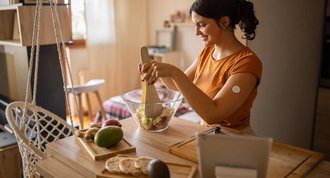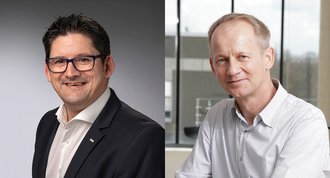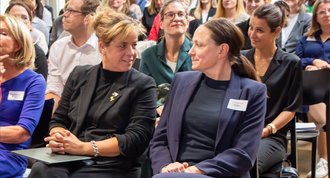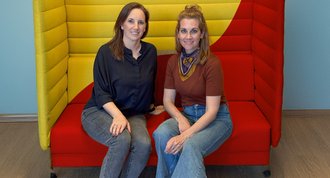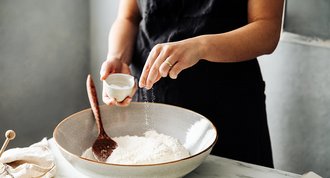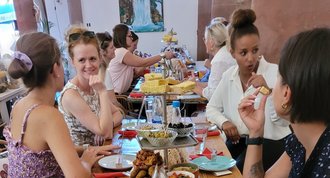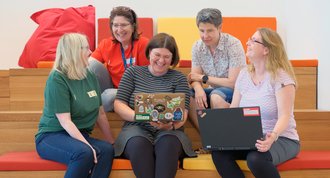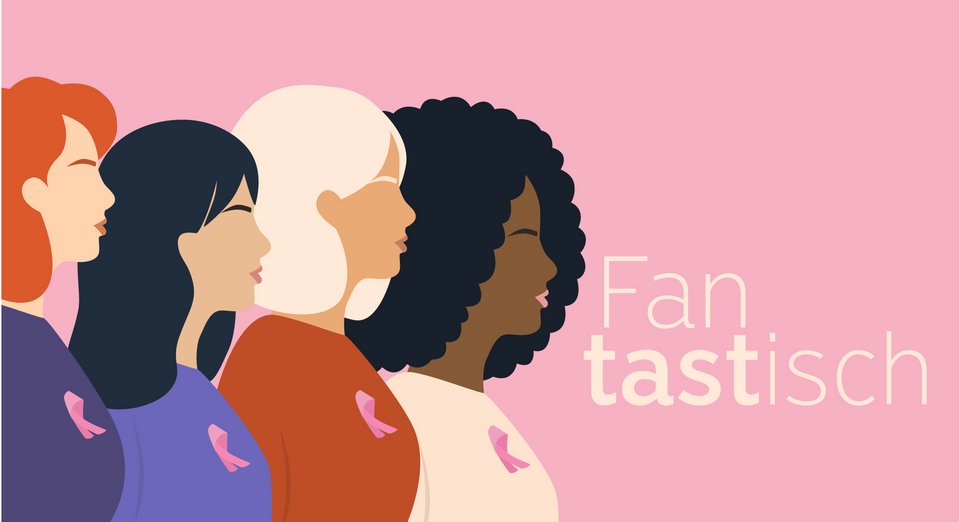
Antonia Greifenberg-Bouhaik is as good as blind - and successfully feels for abnormalities and tumours in the female breast. Many health insurance companies cover this, and REWE Group supports preventive measures like this with time credits.
She has already presented her work at a webinar organised by REWE Group Health Management: Antonia Greifenberg-Bouhaik, 40 years old, three children, is a medical tactile examiner (MTU). She was born with only one functioning eye, but didn't really feel restricted by it. When she was 31 years old, the entire retina of her sightless eye detached. For two years, she was unable to see - at the time with two small children. In the meantime, the vision in her once healthy eye is 20 to 30 per cent.
"It was like a curtain closing. But after two years I thought, at some point you have to work again. When I heard about discovering hands, it sounded like winning the lottery to me, because it combined my interests in the medical and social fields - and the training programme was aimed at blind and visually impaired women.
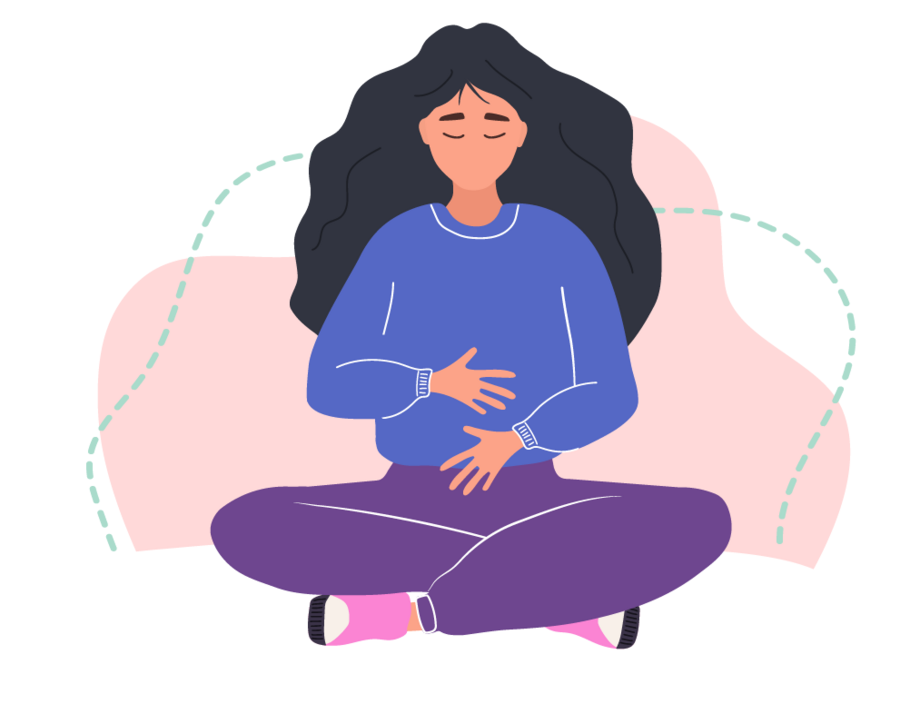 The Mülheim/Ruhr-based organisation discovering hands trains blind and visually impaired women to become medical tactile examiners (MTUs), who are used in the early detection of breast cancer. Background: Blind and visually impaired women have a superior sense of touch. This enables them to recognise the smallest tissue changes in the female breast and thus contribute to the early detection of breast cancer. They use a medically recognised and scientifically validated method that has been proven to detect even smaller tissue changes than sighted doctors. The MTU works largely independently, but always under the responsibility of a doctor. It is used in gynaecological practices and clinics.
The Mülheim/Ruhr-based organisation discovering hands trains blind and visually impaired women to become medical tactile examiners (MTUs), who are used in the early detection of breast cancer. Background: Blind and visually impaired women have a superior sense of touch. This enables them to recognise the smallest tissue changes in the female breast and thus contribute to the early detection of breast cancer. They use a medically recognised and scientifically validated method that has been proven to detect even smaller tissue changes than sighted doctors. The MTU works largely independently, but always under the responsibility of a doctor. It is used in gynaecological practices and clinics.
Source: discovering-hands.de
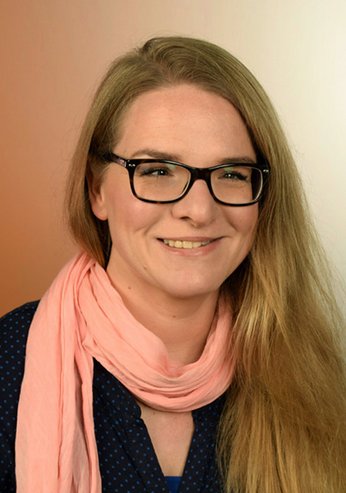 Antonia Greifenberg-Bouhaik
After I was accepted, I organised a place in a nursery and a primary school in Berlin and went there for six months. The training lasted a total of nine months, half a year at school in Berlin and then three months of practical training. It was a very intensive time with a lot of anatomy and intensive practical time with test subjects. We learned what tumours feel like, how to communicate with doctors and how to communicate with patients. Empathy and a certain distance are particularly important when dealing with patients. I don't make a diagnosis, but if I find an abnormality, I tell the patient. The gynaecologists then clarify everything else.
Antonia Greifenberg-Bouhaik
After I was accepted, I organised a place in a nursery and a primary school in Berlin and went there for six months. The training lasted a total of nine months, half a year at school in Berlin and then three months of practical training. It was a very intensive time with a lot of anatomy and intensive practical time with test subjects. We learned what tumours feel like, how to communicate with doctors and how to communicate with patients. Empathy and a certain distance are particularly important when dealing with patients. I don't make a diagnosis, but if I find an abnormality, I tell the patient. The gynaecologists then clarify everything else.
We follow a clear procedure for breast examinations. First, I take a medical history and ask the patient about risk factors, for example. Then I examine the lymph nodes associated with the breast, on the neck, under the armpit, on the breast and the collarbone. Then I systematically sweep the breast. I would notice any differences in temperature or larger cysts. Then I lay the patient on her back and stick a kind of coordinate system on the breast. The lying position has the advantage that I use the rib cage as a natural support. It serves as resistance and this helps with palpation.
I then move along this coordinate system from left to right and then from right to left again. In doing so, I circle my finger in depth. I have to really push in or turn in. I then do this quadrant by quadrant. This allows me to tell the doctor exactly in which field I have discovered an abnormality in the tissue that needs to be clarified.
The doctor then performs the ultrasound, makes the diagnosis and plans the next steps. I "only" tell the patient what I have felt. I still find that difficult, especially when I think it's nothing harmless. But it's part of it. And it's also a good thing, because we MTUs find 30 per cent more tumours than gynaecologists and much smaller ones.
 This is how REWE Group supports you with preventive care:
This is how REWE Group supports you with preventive care:
Employees receive one hour of time credit for every cancer screening they attend. Participating business units are REWE Markt GmbH, PENNY Markt GmbH, DER Travel and Tourism, Kölner Verwaltung, toom Baumarkt DIY store and the participating REWE partner retailers. More information on the time credits can also be found in the REWE Group brochure "You are important".
The medical-tactile examination takes 30 to 60 minutes, depending on the condition of the breast. In addition to the high rate of abnormalities detected on palpation, this is the second strength of my work: I simply have time. The patient can talk to me, she can ask questions, but she can also remain silent. And it's simply a different kind of breast screening. In my opinion, it is best to carry out all three preventive options at regular intervals, one after the other: Ultrasound at the gynaecologist's visit, mammography and our tactile examination.
I work in gynaecological practices that cooperate with my employer. This already exists in many cities in Germany, Austria and Switzerland, and you don't have to be a patient there to make an MTU appointment.
Incidentally, the feedback from patients about my work is nothing but good. It's so marvellous. The examination isn't free, but there are almost 30 health insurance companies that cover the costs. Just give them a call."
Better early detection, higher chances of recovery
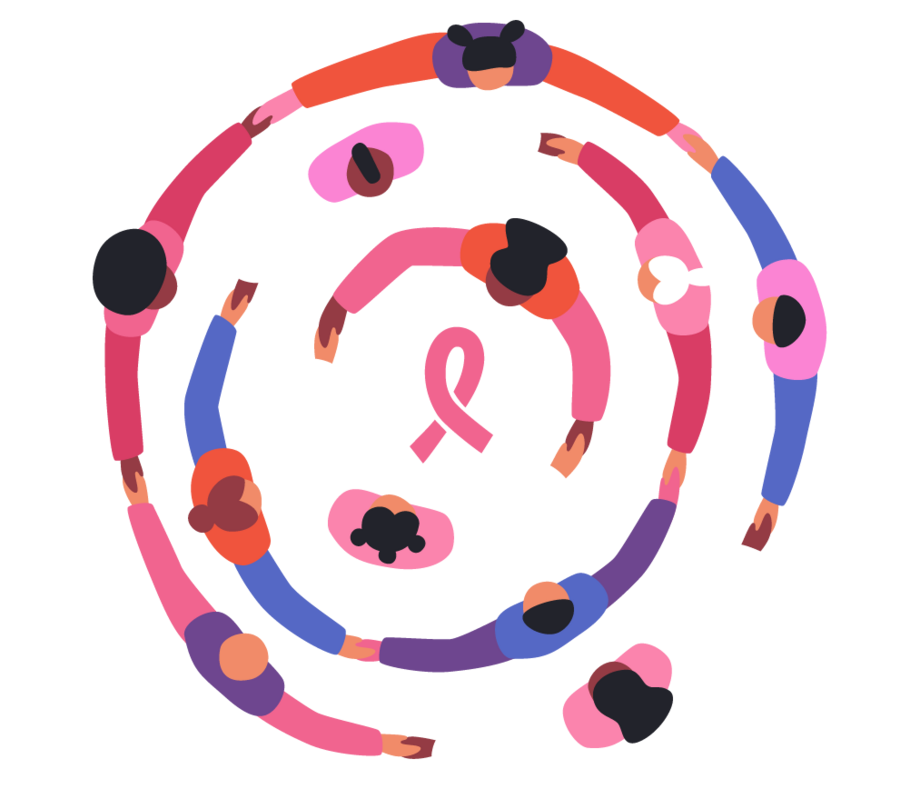 Breast cancer is the most common cancer in women in Germany , accounting for around 30 per cent of all cancer cases. On average, almost 70,000 women are diagnosed with breast cancer every year .Younger women are only rarely affected; the risk only increases from the age of 40 and especially from the age of 50, before falling again from around the age of 70. The average age of onset for breast cancer is around 64 years, with one in four of those affected being younger than 55 and one in ten younger than 45.
Breast cancer is the most common cancer in women in Germany , accounting for around 30 per cent of all cancer cases. On average, almost 70,000 women are diagnosed with breast cancer every year .Younger women are only rarely affected; the risk only increases from the age of 40 and especially from the age of 50, before falling again from around the age of 70. The average age of onset for breast cancer is around 64 years, with one in four of those affected being younger than 55 and one in ten younger than 45.
Although breast cancer is the most common type of cancer in women, it is not the most dangerous. If detected and treated in time, most diseases are curable, and around 87 per cent of all women diagnosed with breast cancer are still alive after 5 years. This positive developmenthas to do with improved early detection, but also with advances in treatment.
Breast cancer research assumes that around a quarter of today's breast cancer cases could be prevented by a healthier lifestyle - i.e. a healthy diet, normal weight, low alcohol consumption, more physical activity and no nicotine.
Source: German Cancer Society
Further links:
How the medical-tactical examiners MTUs work:
https://www.discovering-hands.de/
Here you can find gynaecological practices that cooperate with MTUs:
https://www.discovering-hands.de/praxisfinder
Tips and instructions for self-examination:
https://www.discovering-hands.de/methodik/selbstuntersuchung-ats
The REWE Group brochure can be found on the intranet: You are important
https://intranet.rewe-group.com/contentpage/bltc9cf998a0b62f9af





